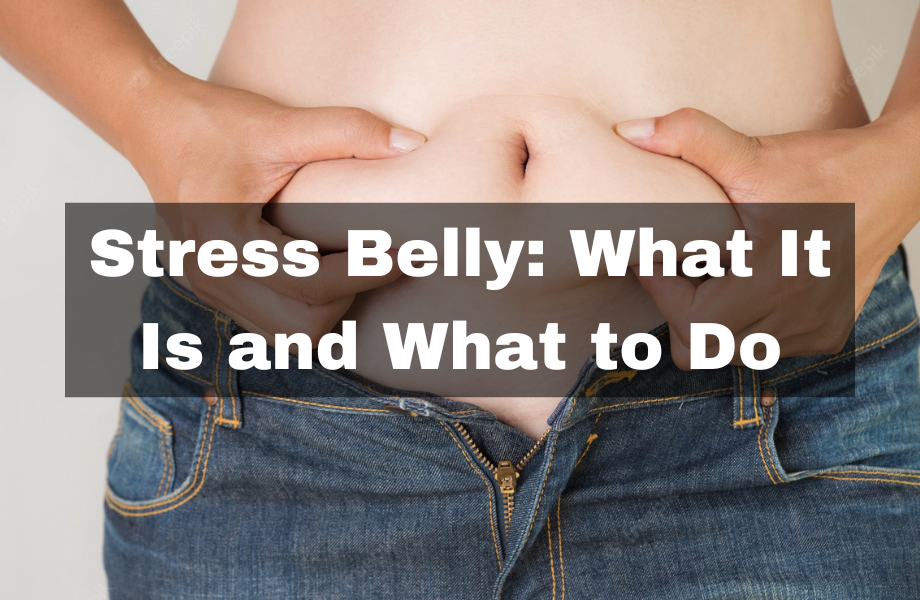Nothing is more stressful than feeling a load of side effects caused by stress but not being able to put your finger quite on it. Your hair is slowly falling out, you may have random breakouts, and you feel bloated all the time. Is it stress? It could be! A stressful belly is a real thing and could be why you struggle to lose weight no matter how much you are working out.
In fact, according to the American Institute of Stress, 77% of Americans feel that stress affects their physical health (1). Even the smallest amount of stress can significantly impact your body fat and tummy. Let’s talk about it and what you can do.
What is a Stress Belly?

When you are feeling stressed, your hormones change and fluctuate. Most of these hormones are active during the most stressful times. Their function is to let your body and mind process and focus during times of fight or flight. But if you are constantly in the fight or flight, the stress hormones like cortisol can be overproduced. High levels of cortisol have been linked to obesity (2).
Cortisol and adrenaline are the two hormones that increase when your body gets put in fight or flight mode. So when your body needs all of its energy to focus on the task at hand, your body’s other functions, such as digestion and metabolism, slow down significantly. You will likely gain weight and fat if you are chronically battling stress.
Different Kinds of Fats
There are two different kinds of fats where it concerns our belly. In order to understand stress belly, it’s worth familiarizing yourself with both. (3)
- Subcutaneous fat can be touched with your fingers. It is just underneath the skin, and between the two, subcutaneous is relatively easier to get rid of. A little bit of it is OK, and some parts of it serve as a health benefit. We need some fat to survive.
- Visceral fat is deep within our abdominals and surrounds our stomach, liver, and intestines. Visceral fat is what makes your waistline bigger. The more you add to it, the harder it is to lose.
Let’s talk about what “normal: body fat percentages are. Keep in mind that everybody is unique, and these are general guidelines, not medical advice.
What is a normal subcutaneous fat percentage?
Of your body’s entire fat percentage, it is normal or recommended that subcutaneous fat should make up 90% of the total body fat your body has.
What is a normal visceral fat percentage?
This means that of all your body fat, 10 percent should be visceral. This is not the same thing as your total body fat percentage.
What Are the Signs of Stress Belly?

So now that we know cortisol and adrenaline are the medical causes of stress belly. What are the signs that indicate we have a stressed belly? Note that if you feel like you eat healthily and you work out, but your weight loss or fat loss does not reflect that, you may be experiencing stress belly.
- Feeling constantly overwhelmed and showing physical signs of stress like hair loss, breakouts, and other effects may also be an indication that you have a stressful belly. Other signs can be irritability, moodiness, tiredness, anxiety, etc.
- One of the least helpful side effects is also having cravings or always feeling hungry. That’s because the more stressed you are, the more ghrelin you produce. Grehlin is a hormone responsible for hunger.
- You may want to exercise hard to try to get rid of stress belly, but too intense exercise actually continues to raise your cortisol levels and creates a need or want for dense food.
Stress belly seems to be a pain which is why we have some tips and tricks for managing and addressing it.
How to Manage Stress Belly

Managing stress belly is no easy feat. Let’s take a look at these top tips.
- Focusing on a good night’s sleep is one of the first and most helpful things you can do to improve your stressed belly. Lack of sleep can cause stress, and when you get rest, your body can recover and get out of survival mode a lot easier.
- A healthy diet may not be the biggest help if you are already eating relatively healthy. However, adding to your stressful belly by eating processed foods, high fat, and sugary items is not going to help your stress belly.
- A healthy diet means limiting your intake of alcohol which can be one of the biggest contributors to stomach fat. That is because your body will burn alcohol first before other food and fat. It also means cutting smoking as this can have a negative impact on our body and ingestion as well.
- Do activities that relieve stress, such as meditation, yoga, and self-care. This may look different for everyone, whether it be a bubble bath in Epsom salts or it is reading a book at the beach. The less stressful belly you will have.
- Exercise is still important when trying to battle stress belly. Long walks for more than 30 minutes are a great way to put your body in a fat-burning state.
How Long Does It Take To Get Rid of Stress Belly?

One of the biggest questions many have is how long you can expect to see results when you start addressing stress belly. That is because the frustration is already built up from trying to manage stress belly without getting any results.
It can take time to limit stress factors and address stress belly, so you may not see results for at least a few weeks. But with a commitment to changing your lifestyle through healthier eating habits, exercise, and managing your stress, it certainly is possible to see results in as little as a week.
The most important factor is to focus on your stress levels and how to put your hormones back to their right and appropriate levels.







